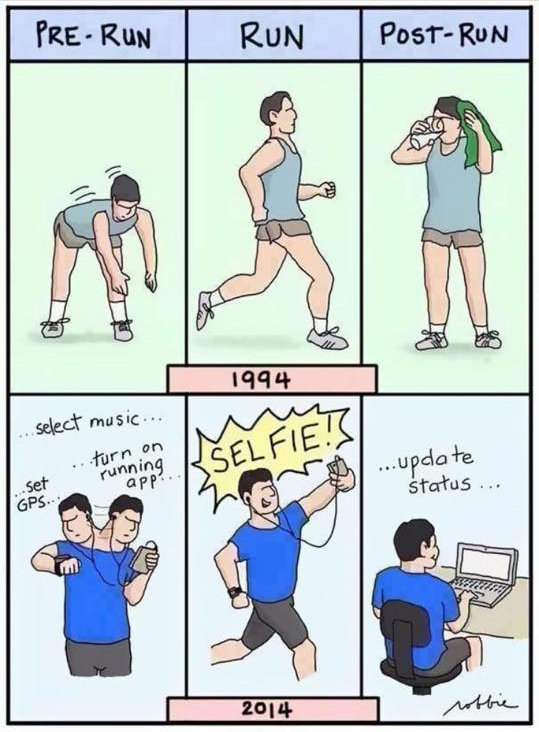Like thousands of others I have signed up to a Spring marathon and launched into 2016 with a training plan to get me to the start mentally and physically prepared for the 26.2 miles ahead. Part of that plan is to run naked more often.
Yup, you read right. NAKED.
No, no, not actually no-clothes-naked. That would be streaking and no one needs to see that. Besides it’s a bit chilly this time of year and I’d have nowhere to keep my house key.
Running naked is a term meaning ditching the technology, just lacing up your shoes and heading out the door into the elements like it is 1995. Radical eh? Well to many and certainly to me – yes!
Technology continues to permeate every aspect of our lives, and wearable running tech is big business. There are GPS watches, heart rate monitors, trainer inserts, head cams not to mention a dizzying array of phone apps to tell us how fast, how far, calories burnt, to improve cadence, pre-programme training, plan routes, navigate . . . . And if you need an incentive to up your pace, there is even an app placing runners in a zombie apocalypse world pursued by the undead.
The undead aside (there are other blogs for that), how much does all this technology really enhance your run, your performance and crucially does it have an impact on the sense of escapism many runners seek when they reach for their trainers?
Since joining the Shine Offline team I have been thinking more and more about my own reliance and interaction with the technology in my life.
There is always ‘an app for that’ and technology to make life simpler and less stressful. But does it? When in my life is technology beneficial and when might it be an idea to take a break and go back to basics: walking across the office to talk to a colleague rather than emailing? Having an alarm clock by the bed not a mobile? . . . What about running without a GPS watch?
On a recent social evening run with my Bearcat running club friends we had a 6-mile loop mapped out that started and ended at a pub (a frequent occurrence – I do love my running club!) As we approached the end of our route and the promise of a refreshing pint we realised we had in fact only run 5.9 miles. So what did we do? We ran a 100 metres or so up the road and back so we could all stop our watches at exactly 6 miles. A few months ago this would not have struck me as bizarre in the slightest. Many an odd look have I had from neighbours as I have zigzagged outside my house so I can clock up a precise number of miles.
The last time I ran a marathon was in 2007. I had an ipod so that Dolly Parton could keep me company on long runs (don’t judge me) and a simple stop watch. My training runs I ran for time on my feet, perceived effort and estimated distance. I didn’t have a clue how far or fast I was actually running. In recent years I have tried to get back to marathon running (and failed, more of that later) and have marvelled at the tech available to me from my basic Garmin watch and an inexpensive app on my phone. The operations, organisation and social aspect of my wonderful running club are run through Facebook and I am also part of an online community of female runners. This has kept me motivated, provided structure, built friendships and let me better understand my running.
But can you have too much of a good thing? For me, the answer is yes and I think this has had both performance and psychological consequences.
 Let’s start with performance
Let’s start with performance
It certainly would not be true to blame my scuppered 2015 marathon plans entirely on technology, but one thing for certain is I got carried away in January, I over trained and I became injured. And technology played a part in that. I set a pace on my watch so it would beep if I dropped below a certain speed. I became obsessed with building up online data through my Garmin as evidence to myself that I was on track. I was over concerned about the training progress of running friends on social media, how long and fast their runs were and I was swept into a Facebook 100-mile challenge. I was training my body, but my head was full of noise, data, the nagging beeping of my watch and the ping of social media. I was out of tune with my body so rather than recognising the warning signs I ran myself into injury.
And then in September last year a funny thing happened. By then injury free I was at the start line of Richmond Running Festival Half marathon. It was a beautiful morning, in Kew Gardens and there I am fussing and waving my left arm frantically in the air and cursing my Garmin as it fails to pick up a signal. It was an anxious start to the race as I was forced to run ‘naked’. How could I tell if I was running fast enough to reach my goal? What if I had set out too fast and would burn myself out? How could I possibly pace myself? But after the first mile I settled into a natural rhythm, got my game face on and ran my ass off. The result? I was shocked to find out I took seven minutes off my previous best time.
Psychological
But running for me is not just about performance. Yes, I set myself goals, but primarily when I run whether alone or in company I do so to get out in nature, to feel the air in my lungs, the strength in my limbs, to leave all the stresses and challenges of daily life behind and escape for a short time. I want to run to that point when the endorphins kick in and all that positive brain stuff happens.
However, in recent times, even when just taking a short ‘runch break’ in a busy working day, I would step out of the door and fuss about the GPS on my watch, check Spotify had downloaded, worry about phone battery, were my Bluetooth headphones connecting and on occasion start my Runtastic app as GPS back up. After all, how could I be sure I had actually run at all without the data to back it up? Calls and emails might interrupt a run, and when I stopped for recovery I would have checked my inbox before getting back in the door as well as reviewing my running stats, uploading the data and deciding whether to share on social media.
I disconnected from nothing. There was no escapism, no sanctuary. I took everything I sought to escape and zipped it in my pocket.
Running naked
The realisation that my tech use whilst running might have an impact on both my happiness and my performance was a big one.
It is an interesting term ‘running naked’. It suggests something daring and radical but also suggests vulnerability. Taking both my phone and watch was a habit, something I was doing automatically without even thinking. And yet the conscious decision to leave them at home even for a short run was surprisingly hard to do. But I am so glad I did!
It really is liberating to get out there and not have to think about your watch or phone! My running feels more focused, I am more aware of my breathing, my form, the world around me and I have space to think again.
I had a joyful moment pausing in Richmond Park early one morning and enjoying the tranquility, the outline of the stags on the sky and a heron by the pond. I reached for my phone and had a pang of regret that I did not have it with me. But this memory has stayed with me, as an experience for its own sake and not as a photo opportunity to tweak and enhance and share on www.
More and more often these days I am deciding to leave for a run with nothing but my oyster card and a house key. Maybe a fiver for emergency haribos.
Finding the right balance – who is running this show anyway?
Don’t get me wrong, I certainly have not ditched the technology completely and there is no question it offers enormous resources when training for my marathon. In my experience though you can have too much of a good thing, so I am seeking to find the right balance: listening to my body more, simplifying things and trying to use technology in a more mindful way.
For routes and distances I already know I run tech free and run for effort. New routes I map out in advance on WalkJogRun (www.walkjogrun.net) and on the occasions I do wish to make use of GPS I use a phone app, make sure that it is on flight mode and tucked away with the sound turned off. This way I can access the run data when needed but I can with as few distractions as possible JUST RUN!
I have every intention of being at on the start line of the Brighton marathon this year. I may even leave my watch on the bedside table!
Anna
X
At Shine Offline we value the role of digital technology in our lives and are working to assist people in using it more mindfully as opposed to not using it at all. By questioning our relationship with technology, changing our habits and setting a Shining example to those around us, we can start to really reconnect with ourselves and others and live a better, more balanced life.
www.shineoffline.com
